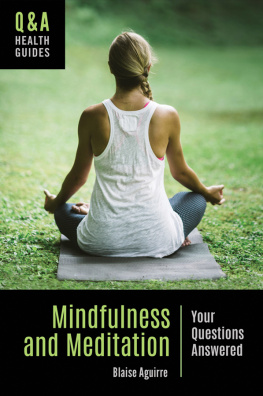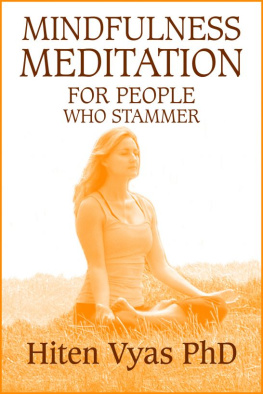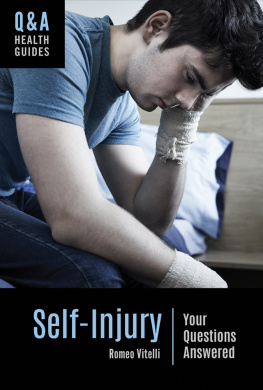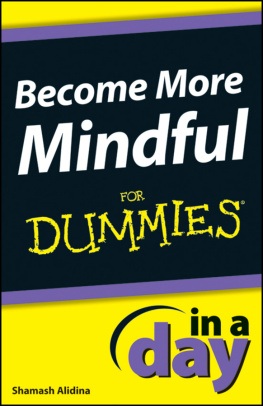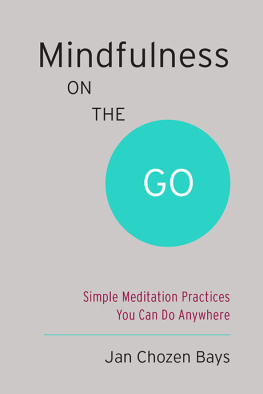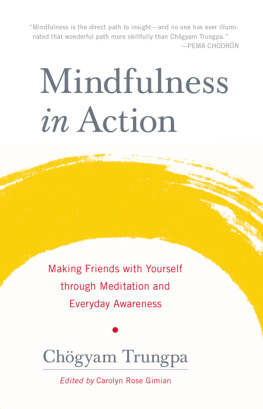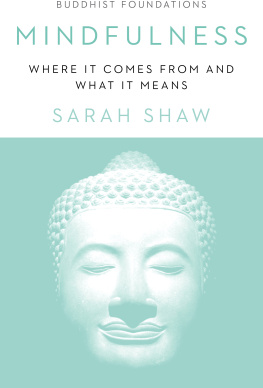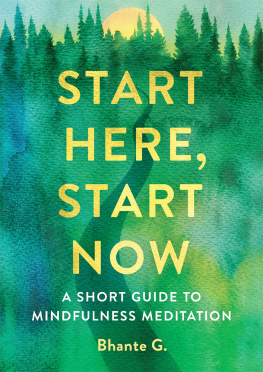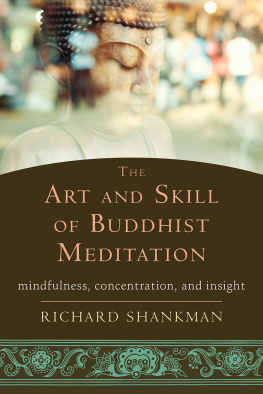Mindfulness and Meditation
Recent Titles in
Q&A Health Guides
Self-Injury: Your Questions Answered
Romeo Vitelli
Living Green: Your Questions Answered
Amy Hackney Blackwell
Sexually Transmitted Diseases: Your Questions Answered
Paul Quinn
Copyright 2018 by ABC-CLIO, LLC
All rights reserved. No part of this publication may be reproduced, stored in a retrieval system, or transmitted, in any form or by any means, electronic, mechanical, photocopying, recording, or otherwise, except for the inclusion of brief quotations in a review, without prior permission in writing from the publisher.
Library of Congress Cataloging-in-Publication Data
Names: Aguirre, Blaise A., author.
Title: Mindfulness and meditation : your questions answered / Blaise Aguirre.
Description: Santa Barbara, California : Greenwood, [2018] | Series: Q&A health guides | Includes bibliographical references and index.
Identifiers: LCCN 2017056251 (print) | LCCN 2017059584 (ebook) | ISBN 9781440852978 (ebook) | ISBN 9781440852961 (alk. paper)
Subjects: LCSH: Mindfulness (Psychology) | Meditation.
Classification: LCC BF637.M4 (ebook) | LCC BF637.M4 A385 2018 (print) | DDC 158.1/2dc23
LC record available at https://lccn.loc.gov/2017056251
ISBN: 978-1-4408-5296-1 (print)
978-1-4408-5297-8 (ebook)
22 21 20 19 18 1 2 3 4 5
This book is also available as an eBook.
Greenwood
An Imprint of ABC-CLIO, LLC
ABC-CLIO, LLC
130 Cremona Drive, P.O. Box 1911
Santa Barbara, California 931161911
www.abc-clio.com
This book is printed on acid-free paper 
Manufactured in the United States of America
To my family, who mindfully accept that I am writing yet another book, even after I have said last one, to all my patients who have shown me and continue to show me the healing power of mindfulness, and to my editor Maxine Taylor who skillfully moved me from not writing another book to getting this one done!
All of us have questions about our health. Is this normal? Should I be doing something differently? Who should I talk to about my concerns? And our modern world is full of answers. Thanks to the Internet, theres a wealth of information at our fingertips, from forums where people can share their personal experiences to Wikipedia articles to the full text of medical studies. But finding the right information can be an intimidating and difficult tasksome sources are written at too high a level, others have been oversimplified, while still others are heavily biased or simply inaccurate.
Q&A Health Guides address the needs of readers who want accurate, concise answers to their health questions, authored by reputable and objective experts, and written in clear and easy-to-understand language. This series focuses on the topics that matter most to young adult readers, including various aspects of physical and emotional well-being, as well as other components of a healthy lifestyle. These guides will also serve as a valuable tool for parents, school counselors, and others who may need to answer teens health questions.
All books in the series follow the same format to make finding information quick and easy. Each volume begins with an essay on health literacy and why it is so important when it comes to gathering and evaluating health information. Next, the top five myths and misconceptions that surround the topic are dispelled. The heart of each guide is a collection of questions and answers, organized thematically. A selection of five case studies provides real-world examples to illuminate key concepts. Rounding out each volume are a glossary, directory of resources, and index.
It is our hope that the books in this series will not only provide valuable information but also help guide readers toward a lifetime of healthy decision making.
I arrived at Harvards McLean Hospital in May 2000 to start work on the adolescent unit. At that time I knew nothing about a new treatment known as dialectical behavior therapy (DBT), which had previously been used to treat suicidal women. McLean was pioneering DBT in adolescents.
Core to DBT is the practice of mindfulness, and although the concept is easy to articulate in theory, the practice and experience is more nuanced. We opened a dedicated DBT unit for adolescents in 2007 and with that I decided that I needed a much deeper understanding of mindfulness.
With that I headed out to Tucson and the Redemptorist Renewal Center in the Sonoran desert. It is a perfect site for mindfulness practice: located in the foothills of the Tucson Mountains on the edge of the Saguaro National Park.
For the next five days I sat in silence together with my fellow retreatants. The experience changed my life. It taught me how to accept things as they are, to become far less judgmental, to tolerate intense emotions, and to recognize that automatic nature of many of my thoughts and behaviors. I noticed that I was far less anxious than I had ever been and, with that, just how powerful mindfulness could be as a tool for healing mental suffering.
This book is a testament to the broad utility of mindfulness and an exploration of the practice beyond its use in mental and physical well-being.
Over the years I have had the opportunity to practice mindfulness meditation in various contexts and with many different people.
I want to recognize the people who have traveled with me on my journey. First, I have deep appreciation for Dr. Marsha Linehan, the developer of DBT, who emphasized the importance of mindfulness as central to mental health and mental healing.
Then to my colleagues at 3East and in particular Janna Hobbs, Michael Hollander, Judy Mintz, and Gillian Galen, who have kept mindfulness central to the work we do every day.
To the Reverend Pat Hawk (may he RIP), leader of the silent retreats in Tucson and the wisest person I ever knew, I thank you. To Zen teacher and fellow DBT trainer Randy Wolpert, gratitude for showing that mindfulness is not all that serious.
I appreciate the teachings of Thich Nhat Hanh, Tara Brach, and Sharon Salzberg, whose writings have deepened my practice; then Larry Kasanoff, for bringing mindfulness to the lay community in our movie Mindfulness: Be Happy Now; to Oprah and Becky Sykes, who get the importance of mindfulness practice in education and wellness.
Finally to my family, who never complain when I leave for a silent retreat and then give me plenty of opportunities to show how much work I have left to do.

